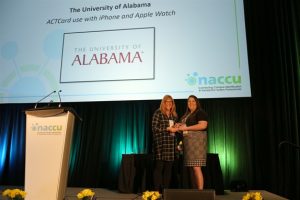The University of Houston's CougarCard is set for an aesthetic refresh, with a new design ready to be printed and issued this coming fall semester.
According to The Daily Cougar, the new card design has been in development for the last two years with the Cougar Card office working the university marketing to narrow the field to three card images late last year.
“It is our intent to elevate the student experience by providing a modern, integrated and extensive card program that will improve flexibility and security across the UH System,” said Deborah Davis, director of the Cougar Card office, in a Daily Cougar interview.
The Cougar Card office deployed selfie stations this month for students, faculty, and staff to update their ID photos, but primarily focused on faculty and staff as most students were in final exams. For students, the Cougar Card office plans to reopen photo submissions again in the fall at which point the selfie stations will return.
Houston leverages MyPhoto, and is encouraging students to use the upload service on the university's AccessUH portal. Students can still opt to visit the CougarCard office in person to take their photo, but the university is recommending that students upload a picture via MyPhoto to avoid waiting in lines.
The photo requirements for MyPhoto uploads at Houston are in keeping with industry standards.
Submitted photos must be in color, have a white or off-white background, feature a natural expression, with the subject facing directly towards the camera. The subject of the photo also can’t be wearing a hat or sunglasses, but may wear reading glasses or religious headwear so long as it does not obscure or cast shadows over any part of the face.
The first card replacement during the design transition is free, but any subsequent replacements for updating photos, lost cards or name changes will incur a $10 charge. Damaged or worn cards will continue to be replaced at no charge, so long as the cardholder turns in the old card at the Cougar Card office.
Food insecurity is a growing issue for students nationwide. The rising cost of tuition and academic materials, coupled with everyday living expenses, has put a pinch on some of the essentials that students need in order to thrive — including meals.
This trend has given rise to food banks and meal donation programs on campuses across the country. But there’s one meal donation system at the University of California, Merced that’s set the bar particularly high both in terms of the service it provides and how the system itself has been implemented.
What makes the iCare meal donation program at Merced so unique is that it's been built from the ground up by the CatCard office, led by Abraham Cereno, the university’s Associate Director of the CatCard Program and Application Systems.
"iCare is immediate, private and automated, allowing a full week of meals to be requested from a meal pool using any device, from any location and at any time,” says Cereno. “It’s fully integrated with our CatCard campus identification system, and provides information on trends and usage.”
Cereno has been working on what would eventually become the iCare program since 2016, when a freshmen donated his meal card to fellow students studying for finals. At the close of the 2016 academic year, UC Merced freshmen Harrison Tom saw that he had more money left on his prepaid meal plan than he could spend before the end of the semester.
May 2016: Merced freshman, Harrison Tom, buys and donates 100 meal vouchers to other students studying for finals.
July 2016: CatCard and Dining Services collaborate to understand the initiative, and requirements.
September 2016: CatCard runs student focus group. In-house app development begins. Software and hardware requirements established.
November 2016: iCare demo for management, Dining Services, and beta test with student focus group.
January 2017: CatCard office officially launches iCare web app. iCare program enables students to donate excess funds to fellow on-campus peers in need.
At Merced students receive a starting balance in the fall based on their chosen board plan. The unused balance carries over to the last day of the spring semester, at which point any remaining balance is forfeited.
“Reluctant to lose the remainder of his balance, Tom got creative,” says Cereno. “He used the remaining money to buy 100 meal vouchers and offered them up to hungry students.”
That single altruistic decision on the part of one student had an inadvertent domino effect.
“Soon, other students began redeeming the meal vouchers nearly every hour, which brought its own challenge. Vouchers at the time were printed, and the redemption process was manual, difficult to manage and not entirely secure,” explains Cereno. “We agreed that it made more sense to donate meal plan dollars rather than vouchers, so CatCard and Dining Services staff collaborated to create a better, automated process.”
UC Merced’s iCare meal donation program is the result of that process. Launched in January 2017, iCare is a mobile app that enables students to donate their excess meal plan dollars to peers in need.
Since launching two years ago, iCare has processed over $247,000 in excess meal fund donations and issued more than 39,500 meal swipes to qualifying students.
The University of Memphis announced its partnership with new food-service provider, Chartwells last month. University President, David Rudd has since revealed some of the new additions that Memphis students can expect from the new partnership.
In a series of tweets, Rudd posted some of the plans for Memphis' new campus dining options, including an overhaul to existing infrastructure, and new entries in the form of food trucks.
You'll be seeing local food trucks on campus in the fall. Bringing more Memphis to the U of M. pic.twitter.com/JqRonL81rS
— Dr. M. David Rudd (@UofMemphisPres) April 30, 2019
In addition to food trucks, outdoor pop-up stations will also be provided as an added form of dining for students.
Our new dining partner, Chartwells, will also be utilizing outdoor pop-up stations around campus next year. pic.twitter.com/Ma3siRsqg8
— Dr. M. David Rudd (@UofMemphisPres) May 1, 2019
According to communications from Rudd, the deal with Chartwells will include guaranteed commissions, a signing bonus, rebate sharing, repairs and maintenance, capital investments, capital innovation funds, transition and startup costs, annual in-kind funds, and financial support for dietitians and internships.
The University of Memphis' 15-year partnership with Chartwells will begin Fall 2019, with all dining and catering operations being fully operated by Chartwells starting with the first week in August. Other additions will include POS system upgrades, a new mobile ordering app and ordering kiosks.
The ongoing debate in North Carolina over the use of student ID cards as a form of voter identification has taken another step forward.
As reported by Wilmington's WECT News 6, House Bill 646 received final approval by a 109-6 vote in the North Carolina House of Representatives this week. The bill is intended to facilitate increased voting access amongst college students by enabling the use of university-issued ID cards for identity verification at polling stations across the state.
This latest approval vote comes after considerable reticence and pushback from a number of universities in the state over some of the wording in the proposed bill, as well as some of the requirements that voter ID compliance would impose on the ID card issuance process.
Much of the early reticence was caused by a mandate that the “chancellor, president or registrar” of each university must submit a signed letter to the State Board of Elections “under penalty of perjury,” affirming that the institution’s student ID cards are issued only after an enrollment process that confirms the student’s Social Security number, citizenship status and birthdate.
According to state lawmakers those concerns have been addressed.
“We worked together with our colleagues across the aisle and across the building to accomplish a common-sense solution to voter ID implementation,” said Rep. David Lewis (R-Harnett) during debate on the bill. “This update to the original bill conclusively resolves all known issues identified by the university system and Board of Elections. We worked with both of those entities to identify and address barriers to IDs being approved.”
The bill will add student ID cards to the existing list of voter identification in the state, including driver licenses, passports, military and veteran IDs, voter ID cards, as well as state and local government IDs.
House Bill 646 also extends the cutoff date imposed on state and private universities, community colleges and charter schools to ensure their campus cards are voter ID compliant from March 15 to November 15, 2019.
WECT reports that as of December 2018, when the constitutional amendment mandating photo identification a requirement at the voting booth was passed, as many as a dozen institutions in the UNC system were issuing ID cards that were not eligible forms of voter identification.
House Bill 646 allows voter ID cards to feature photos not taken directly by, but rather obtained by qualifying institutions -- which under the new bill will include universities. Forms of voter ID must bear a frontal image that includes a clear, accurate likeness of the individual's face.
The Hyogo College of Medicine in Nishinomiya, Japan is using a facial-recognition biometric system to log student attendance in classrooms.
As reported by The Japan Times, tablets are used to check student faces against pre-registered accounts in the biometric database, and is the first program of its kind in a Japanese university setting.
The biometric database has enrolled 470 students to date. Students register their attendance using the tablets at the beginning of the class period, and then pass the device to the next student. The devices are held up to the student's face, and using the tablet's on-board camera, reads and matches the face with those enrolled in the database.
If the facial recognition scan doesn't work, students can alternatively enter their identification numbers on the tablets to log their attendance. As an added failsafe, the teacher's tablet monitors in real time the attendance process by showing images of the students that have successfully conducted the facial recognition process.
A total of 16 tablet devices with facial recognition functions have been deployed as part of the biometric initiative. Four tablets -- one for teachers, and three for students -- are placed in each lecture room and are used for freshmen, sophomores, juniors and seniors at the college.
The Japan Times also reports that the college intends to utilize the biometric attendance system to identify potentially at-risk students. The idea being that the attendance solution can identify long-term or consistent absentees at an early stage, and notify faculty so that appropriate physical and mental care can be offered to the student.
The university implemented the biometric system to prevent students from fraudulently logging attendance on behalf of other students. The facial recognition solution is also expected to expedite and improve efficiency associated with taking roll.
The facial recognition system replaces a previous attendance process that saw teachers hand out and collect paper attendance cards. That data was then later manually logged into the college's educational affairs system. The college estimates that the biometric system could save as many as 425 hours previously spent on attendance across 1,700 lectures held in one year.
Much of the card-technology discussion today is driven by smart cards and mobile credentials -- and for good reason. They're established technologies that have proven their worth as more secure campus card solutions than their prox and mag stripe precursors.
And yet there remains a staunchly loyal, and surprisingly large, group of institutions that continue to issue these less secure, legacy card technologies. In fact, the decision of whether a university should upgrade its card technology remains one of the most popular discussions in the campus card space to this day.
At CR80News, it's easily been one of the most covered topics over the years, and in our 2012 coverage "Married to the mag" we tried to better understand why campuses were so reticent to make the switch.
For some the most immediate reason was simply the reliability of the mag stripe card, which at the time of publication, had already been leveraged on campuses for 20 years or longer. It's long been proven that mag stripe as a technology is inherently insecure and has since been eclipsed by the security capabilities of smart card technology. But in terms of convenience mag stripe has been hard to beat. It just works, and for many institutions that's all that mattered.
In addition to some campuses remaining loyal to mag stripe for convenience and stability reasons -- because recarding can be a nightmare -- other campuses avoided upgrades because the costs were too prohibitive. Some universities and card offices don’t want to, or can't, dedicate the funds needed to support a campus wide re-card, install new readers and re-tool its infrastructure.
Included in our coverage were testimonials from Valdosta State, Oklahoma City University and Mount Holyoke who at the time were all engaged in different stages of the decision making process. It's interesting to take a look back at this process from a place where mag stripe has largely given way to more secure credentials, and most recently, mobile credentials.
For more on this card technology migration discussion, check out our full coverage in "Married to the mag."
Read Winkelman, Vice President of Sales at CBORD, discusses the company's suite of solutions and how they contribute to CBORD's Connected Campus concept.
Highlighted in the video are the company's efforts around being more open, mobile and connected. Winkelman explains how CBORD has opened its APIs to more applications in the wallet, establishing more partnerships with POS providers, and moving the company's offerings more aggressively to the cloud.
Also hear about how CBORD is enhancing its applications to meet the demands and expectations of the modern student with a rundown of the GET app, and how it can be leveraged to maximize not only the student's experience on campus, but also bolster their engagement and success.
Voter identification is crossing paths with the student ID card on a more frequent basis, and Purdue University's campus card has sparked discussion amongst elections officials in Tippecanoe County.
As reported by the Lafayette Journal & Courier, Purdue's surrounding Tippecanoe County has been using a workaround solution since 2008 that enables Purdue students to vote with their university-issued ID cards. But a county clerk has recently brought the topic back to the fore, questioning whether the practice is in keeping with state voter identification laws.
Specifically, Purdue's campus card lacks the required expiration date that valid forms of voter identification in Indiana must have.
Reporting on the matter in 2008, the Journal & Courier said that acquiring card readers from the university to read student credentials at the voting booth was too cumbersome, so the university instead provided the county with digital, searchable lists of students enrolled for the 2008 spring semester a week prior to the primary elections. The Election Board deemed that a Purdue ID card paired with a check against the university-provided list was sufficient to meet state voter ID laws.
A version of that system has been in use ever since.
Last week Tippecanoe County Clerk Julie Roush raised concerns over the legality of the process, stating that she initiated the conversation because she couldn’t find a written policy in the county’s vote center plans regarding the handling of Purdue IDs.
“Listen, if the state says it’s OK, I’m OK with that,” Roush said. “If we can work out something with Purdue, that would be even better. But I want to be lawful.”
Purdue University has pledged its full cooperation in finding a solution that will meet state voter identification standards and released an official statement on the matter, saying:
“In past elections, Tippecanoe County has allowed Purdue students to vote at on-campus polling sites using their university-issued ID cards as identification for voting purposes, as long as their name appeared as active in the online student directory. We saw the reports over the weekend that this arrangement may no longer be sufficient. We look forward to speaking with state and county officials to learn more and how we can be a partner in facilitating voting.”
Indiana voter identification laws state that a student ID card from an in-state university may be used if it meets the same requirements as the other acceptable forms of identification at the polls. That includes four primary components: name, photo, an expiration date proving the credential is current, and that the credential be issued by the state of Indiana or the U.S. government. In most cases, driver licenses, passports, state-issued IDs through the BMV or military identification are all acceptable.
The winners of 2019 NACCU Awards were announced on April 10, 2019 at the Association’s 26th Annual Conference in Hartford, Connecticut.
NACCU recognizes the following individuals and institutions for their outstanding accomplishments over the past year:
NACCU is proud to recognize Jessica Bender of Palm Beach State College as the recipient of the 2019 NACCU Distinguished Service Award.
The NACCU Distinguished Service Award, sponsored by PERSONA Campus Solutions by ASSA ABLOY, is presented to an individual who has advanced the industry, exhibited entrepreneurial spirit, is an active member of NACCU, is actively involved in R&D, and who is active in the industry through serving on advisory boards and/or actively educating through presentations and sessions.

Jessica Bender receives the NACCU Distinguished Service Award from Jim Primovic.
At her campus, Jessica has worked with leaders to reduce costs while increasing campus services and revenue. She was instrumental in the conversion of the campus transaction system at Palm Beach State College to a new platform to further control institution expenses and provide enhanced services.
NACCU also recognizes Jessica for her efforts in mentoring and shaping many of the talented leaders in the campus card industry. She is a wise counselor, a standard bearer of integrity and highly respected in the field. An outstanding professional, mentor, teacher and colleague. She always shines the spotlight away from herself, while promoting the development of others and the profession as whole. Jessica has been out front in the development of programs that have helped our members thrive and continue to thrive for years to come.
Her work on the Professional Development committee with the development of the NACCU New Professionals Institute (NPI), webinars and other initiatives and events help to ensure the success of NACCU members and the industry. Jessica has also helped lead the Association by serving on the Board of Directors for six years in a variety of roles including President Elect, President, and Immediate Past President. She also served on the Executive Director Search committee to replace Lowell Adkins upon his retirement.
Since her retirement from the NACCU Board this past year, Jessica continues to serve the Association in a variety of ways, including her most recent role as the 2019 conference chair.
NACCU is proud to announce that the Nova Southeastern University SharkCard office is the recipient of the 2019 NACCU Best Card Design Award. ColorID’s David Stallsmith presented the award to Vernol Robinson, Director of SharkCard Services.
“This award makes an overall statement that the Student ID Card has evolved to be so much more. We are a crucial part of the institution and form part of the foundation of the student experience,” says Robinson. “We are truly honored and humbled to win this award. It is a great feeling to be recognized by our peers at NACCU. It is also great to bring this award back and present it to our leadership so they too can be a part of this experience.”

The Nova Southeastern University SharkCard.
The updated SharkCard design will be released to the campus community in Fall 2019.
The NACCU Best Card Design Award, sponsored by ColorID, is presented to the institution which is first selected as one of five finalists by the Awards Committee based on a grading matrix, then receives the most votes from NACCU members prior to and during the NACCU Annual Conference.
NACCU presented Abe Cereno from the University of California, Merced with the 2019 Innovative Technology Award for the university's iCare app that addresses food insecurity on campus. The Innovative Technology Award is awarded annually to an institution that has introduced a unique and innovative technology-based solution to a problem or opportunity.
Statistics show that as many as 60% of students have experienced food insecurity while enrolled. In May of 2016, a student shared his meal plan funds with other students, inspiring the UC Merced CatCard office to launch an app to allow students to easily donate meal funds to their peers who are experiencing or at risk of food insecurity.

Abe Cereno accepts the Innovative Technology Award from HID's Brett St. Pierre.
iCare offers students immediate, private, and automated access to request meal funds equivalent to a full week of meals accessible from any device, anywhere, anytime. iCare is integrated with UC Merced’s CatCard campus card systems, and provides tracking, demographics, data analysis, and trends of student donations and requests to management. Since launching two years ago, iCare has provided a total of $247,198 excess meal funds and 39,552 meal swipes to students.
The University of Alabama is the recipient of the 2019 NACCU Best Video Award. NACCU Awards Committee chair Wendy McCrory presented the award to Alabama's Courtney Petrizzi.
The “ACT Card Mission” video was one of three finalists which was voted on and selected as the recipient by members who voted live at the conference and online.
NACCU congratulates the University of Alabama as the recipient of the 2019 NACCU Best Video.
NACCU presented the 2019 NACCU New Professional Award to William Bourlier from the University of Southern California. The NACCU New Professional Award is presented to an individual who has made significant contributions to their institution, the industry and to the association within a relatively short period of time.

The University of Southern California's William Bourlier accepts his New Professional Award.
William joined USC in March 2015. He brought a high level of energy and creativity to the operation, and poured himself into the campus card environment. William made it his mission to learn as much as he could through NACCU’s listserv, web conferences, annual conferences, presentations, and networking. He currently serves on NACCU’s Volunteer Development Committee and has served as a volunteer at the annual conference.
NACCU congratulates William Bourlier as the recipient of the 2019 NACCU New Professional Award.
The University of Alabama Action Card Office is the recipient of the 2019 NACCU Best Marketing Campaign Award for their marketing of the new #ACTCardinAppleWallet mobile credential.

Alabama's Courtney Petrizzi accepts the 2019 NACCU Best Marketing Campaign Award.
The University of Alabama was one of the three pilot universities to offer the innovative new mobile credential program, which enables faculty, staff, and students to add card functionality to their iPhone and Apple Watch.
To encourage implementation and participation across campus of the #ACTCardinAppleWallet mobile credential, the Action Card Office developed a comprehensive, well-planned marketing campaign to inform every campus community member of the new program. ACTCard was advertised on social media, and the staff held tabling events, met with campus groups, demonstrated use at orientation and developed videos, including one recorded by head football coach Nick Saban.
NACCU congratulates The University of Alabama as the recipient of the 2019 NACCU Best Marketing Campaign Award.
NACCU is proud to announce that Scott Brannan from Temple University was presented with the inaugural NACCU 2019 Outstanding Volunteer Award. Richard Tamborelli, NACCU 2018-2019 NACCU Board President, presented the Award to Scott during the Volunteer Recognition Luncheon.

Temple University's Scott Brannan accepts the Outstanding Volunteer Award.
A new award for NACCU, the Outstanding Volunteer Award recognizes an individual who has demonstrated exemplary volunteer service to the mission, goals and work of NACCU during the current or previous calendar year, and who encompasses the ideals of vision, diligence and commitment to service to the NACCU community.
A number of NACCU volunteers were nominated by peers for the award. Scott Brannan, the recipient of the award, was nominated by multiple individuals, which speaks to the commitment he has to the association.
One nomination noted, “This volunteer is the type of person this award is intended to honor. This volunteer loves NACCU and will volunteer his time and energy for the conference to be a success - and has done so for the past 15 years. I see this volunteer as Mr. NACCU - always with a smile on his face, welcoming people to NACCU and making friends. I cannot imagine NACCU without this person in it.”
Another nomination stated, “This volunteer has served in many capacities, but his biggest impact is always his latest impact. He works to create an inclusive environment where all members feel welcome and know they have a connection.”
Those who have been involved in NACCU for any amount of time know Scott as a “perpetual volunteer” and greeter at conferences, always working to enhance members’ experiences at events.
NACCU is proud to announce that Duke University and The University of Alabama jointly received the prestigious J. Paul Melanson Award at the 26th Annual NACCU Conference. Richard Tamborelli, NACCU 2018-2019 NACCU Board President, presented awards to Jeanine Brooks from The University of Alabama and Barton Lawyer from Duke University.

Jeanina Brooks and Barton Lawyer (right) accept the J. Paul Melanson Award.
The J. Paul Melanson award is named in honor of one of the founders of NACCU. This award is presented to members our community who have spurred the growth of the campus card industry, been pioneers in campus cards, significantly and freely helped NACCU members to implement or advance systems on their campuses, or been instrumental in the growth and stability of NACCU. Recipients of this award are identified by the NACCU Board of Directors at their discretion and this award is not presented every year.
The J. Paul Melanson award has been presented in 2019 to two universities that have worked tirelessly to advance the development of a mobile credential provisioned to the Apple Wallet. These schools pushed the envelope to make implementation of this technology possible, from ideas, concepts, and direction, to internal campus development and scripting, to hands-on testing and programming.
As this technology continues to roll out at other universities, NACCU recognizes these two leaders within the Association's membership. The dedicated teams from Duke University and The University of Alabama are applauded, and NACCU is proud to recognize their accomplishments in pioneering this major turning point for the entire campus card industry.
The University of North Florida is mulling updates to its campus card that would make the ID card a viable form of voter identification, as well as changes that would support preferred names.
As reported by student publication, The Spinnaker, the changes were proposed following a meeting of NextGen Florida and students, administrators, and student government. According to a student government spokesperson, the new Osprey 1Card could be approved with printing beginning as soon as next month.
A separate initiative is also in the works that would see a preferred name option implemented for the new campus cards. There is no word yet from student government officials as to how the two initiatives could potentially conflict with one another in practice.
In 2018, NextGen America began focusing on registering and boosting young voter turnouts in eleven states. A spokesperson for the organization says that its Ballot Access Campaign is concerned with implementing on campus cards the signature panel necessary to make a student ID card a valid form of voter identification at the voting booth.
The use of campus cards as a form of voter identification has gathered significant steam in recent months. Most recently, initiatives both at the university level and from higher up the legislative food chain have been met with mixed reception in Texas and North Carolina.

